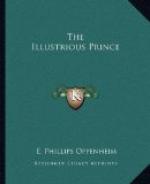There was a short silence. The Prime Minister and Bransome exchanged rapid glances.
“These, then,” Penelope said slowly, “were the things you left unsaid.”
The Prince raised his hand a little—a deprecatory gesture.
“Perhaps even now,” he said, “it was scarcely courteous of me to say them, only I know that they come to you as no new thing. There are many of your countrymen who are speaking to you now in the Press as I, a stranger, have spoken. Sometimes it is harder to believe one of your own family. That is why I have dared to say so much,—I, a foreigner, eager and anxious only to observe and to learn. I think, perhaps, that it is to such that the truth comes easiest.”
Of a purpose, the three men who were there said nothing. The Prince offered Penelope his arm.
“I will not be disappointed,” he said. “You promised that you would show me the palm garden. I have talked too much.”
CHAPTER XXIX. A RACE
The Prince, on his way back from his usual before-breakfast stroll, lingered for a short time amongst the beds of hyacinths and yellow crocuses. Somehow or other, these spring flowers, stiffly set out and with shrivelled edges—a little reminiscent of the last east wind—still seemed to him, in their perfume at any rate, to being him memories of his own country. Pink and blue and yellow, in all manner of sizes and shapes, the beds spread away along the great front below the terrace of the castle. This morning the wind was coming from the west. The sun, indeed, seemed already to have gained some strength. The Prince sat for a moment or two upon the gray stone balustrade, looking to where the level country took a sudden ascent and ended in a thick belt of pine trees. Beyond lay the sea. As he sat there with folded arms, he was surely a fatalist. The question as to whether or not he should ever reach it, should ever find himself really bound for home, was one which seemed to trouble




